CrimethInc.
Steal Something from Work Day 2022
Some Stories from the Old Days
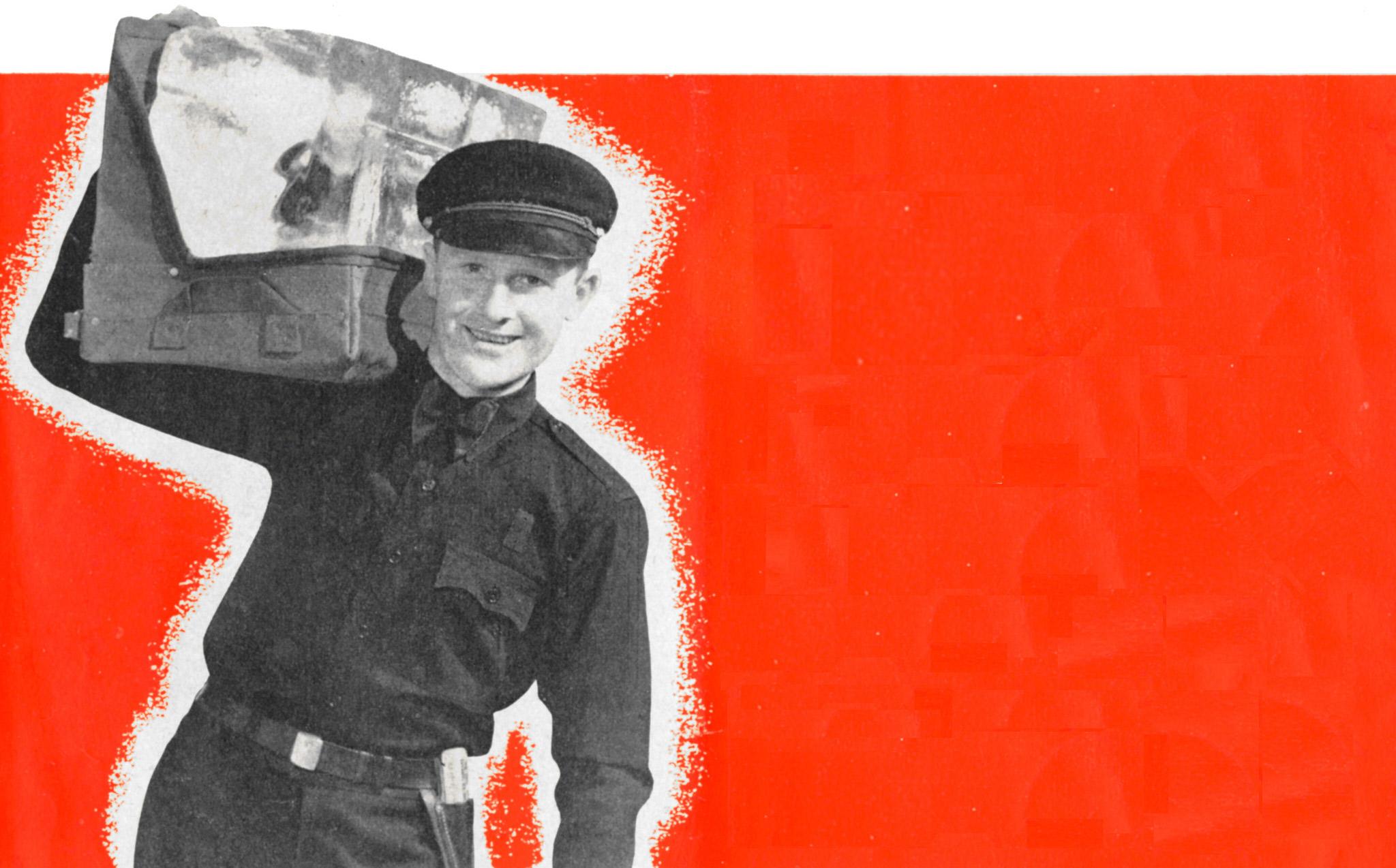
It’s that time of year again! This year, to observe Steal Something from Work Day, we present a handful of stories from workers who have turned the tables on their employers over the years. Enjoy reading and stay safe as you pull off your own Robin Hood operations.
As usual, you can read a wide array of agitprop, theory, and personal narratives on the Steal Something from Work Day website. This year, we welcome new Steal Something from Work Day initiatives in Dutch and Hebrew.
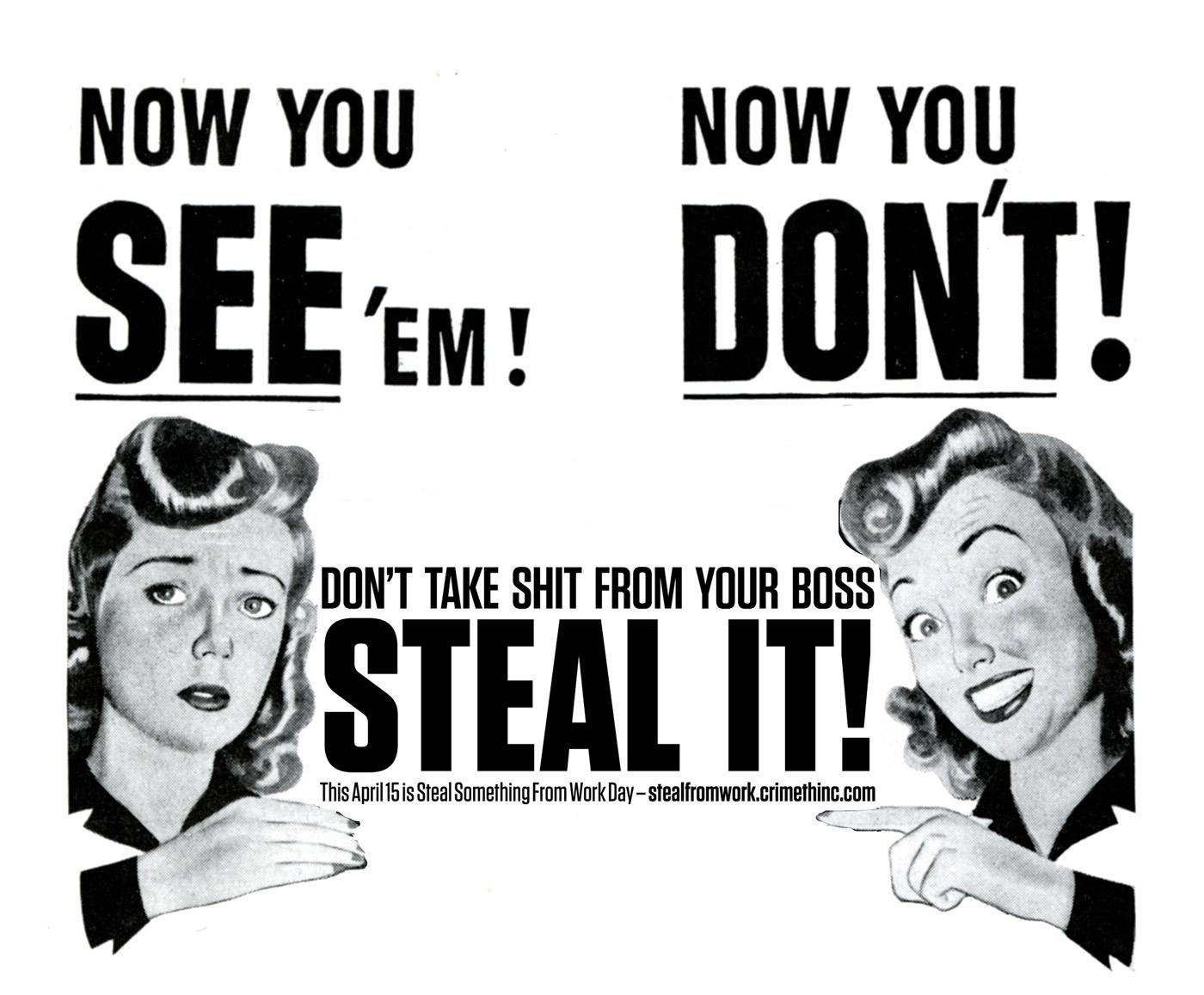
The Good Old Days
Sometime in the 1990s, my friend from high school was working at a gigantic and direly evil corporate department store. One day, she injured her hand in the box crusher. Far from giving her any paid time off or workmen’s compensation or anything of the sort, her employer told her in so many words to shut up and get back to work if she wanted to keep her job. This angered my friend, whose family was not well off and who needed the income.
My friend called me up one day and said, “I’ve got a plan. I’m certain that it will work.”
Before I go any further, I would like to say that in general, I do not make a practice of incriminating myself or others, but that the statute of limitations pertaining to this affair has long since expired. Furthermore, I would like to stress that this particular caper would never work now. This story takes place before CCTV was widely in use, before most transactions were done via credit or debit card. Back then, payment with cash or check was much more common. At the time, this scheme was fairly risky. In 2022, it would be a certain trip to jail. Anyone currently in a similar situation will have to develop other techniques.
“OK,” she said. “At the start of the semester, the university always sends people into my store to make bulk purchases. They don’t give them cash. They come to the register and request this form where they fill out the account information for the order. I memorized it. So, this is all we have to do. We’ll think of everything we could possibly want that will fit in a shopping cart. You come in while I’m working and fill that cart to the brim. Come to my register and ask me for one of those forms. Fill it out correctly. I’ll ring everything up like normal, and you can stroll right out the door. Eventually, the university will get the bill. They’ll say, ‘Hell no, we didn’t order any of this bullshit,’ and the store will take the loss. That’s what they get for fucking up my hand. If they ever try to question me, I’ll say ‘Hell if I know what the problem is, I double-check all the account information any time I ring those orders up, what else do you want me to do?’”
Adding to the finesse of this scheme was the fact that my friend and I were of different racial and subcultural backgrounds, which if anything may have been more relevant in our town back then than it would be today. Looking at us in line at a store, most people probably would not have immediately assumed that we knew each other. This is one of the benefits of going to public school.
“You’re a goddamn genius,” I said. “Let’s do it.”
So we did. My friend’s first request was that she wanted the nicest fishing pole in the store. We pulled the plan off without a hitch!
In retrospect, the wise thing to do at this point would have been to call that a win and quit while we were ahead. That is not what we did. Instead, we ran this caper several more times over the next few months. We both put new stereos in our cars. It got to the point where neither of us really even wanted anything else that they were selling at that store.
By this time, it was starting to get cold. We had another idea.
“You know who probably could use some of this shit?”
We started ringing up large piles of hats, gloves, thermals, socks, and nice warm sweaters, which I would merrily take down to Food Not Bombs at the park on Saturdays. Many of the people who would gather in the park had no houses to sleep in and little access to resources. They were accustomed to seeing us show up with buckets of vaguely edible vegetarian slop; they know that we weren’t working with a tremendous amount of access to resources ourselves. It was easy enough for them to put two and two together when we suddenly started unloading truckloads of brand-new winter clothes.
“Damn, this shit is stolen, isn’t it?” people would ask me.
“Shit, I don’t know, probably,” I would say. “This guy keeps donating it to us.”
“Well, I don’t give a damn. Yeah, I’ll take some of those gloves. It’s colder than a motherfucker out here.”
In retrospect, we were pushing the boundaries of what was advisable even during the analog era. But the company never caught on! Eventually, we decided to lay off for a while. Some time later, my friend got into a heated argument about unrelated matters with her supervisor, who fired her. End of story.
Years later, my friend and I reconnected to discuss our youthful artistry one last time.
“Damn, that shit was glorious,” she said. “But we got lucky.”
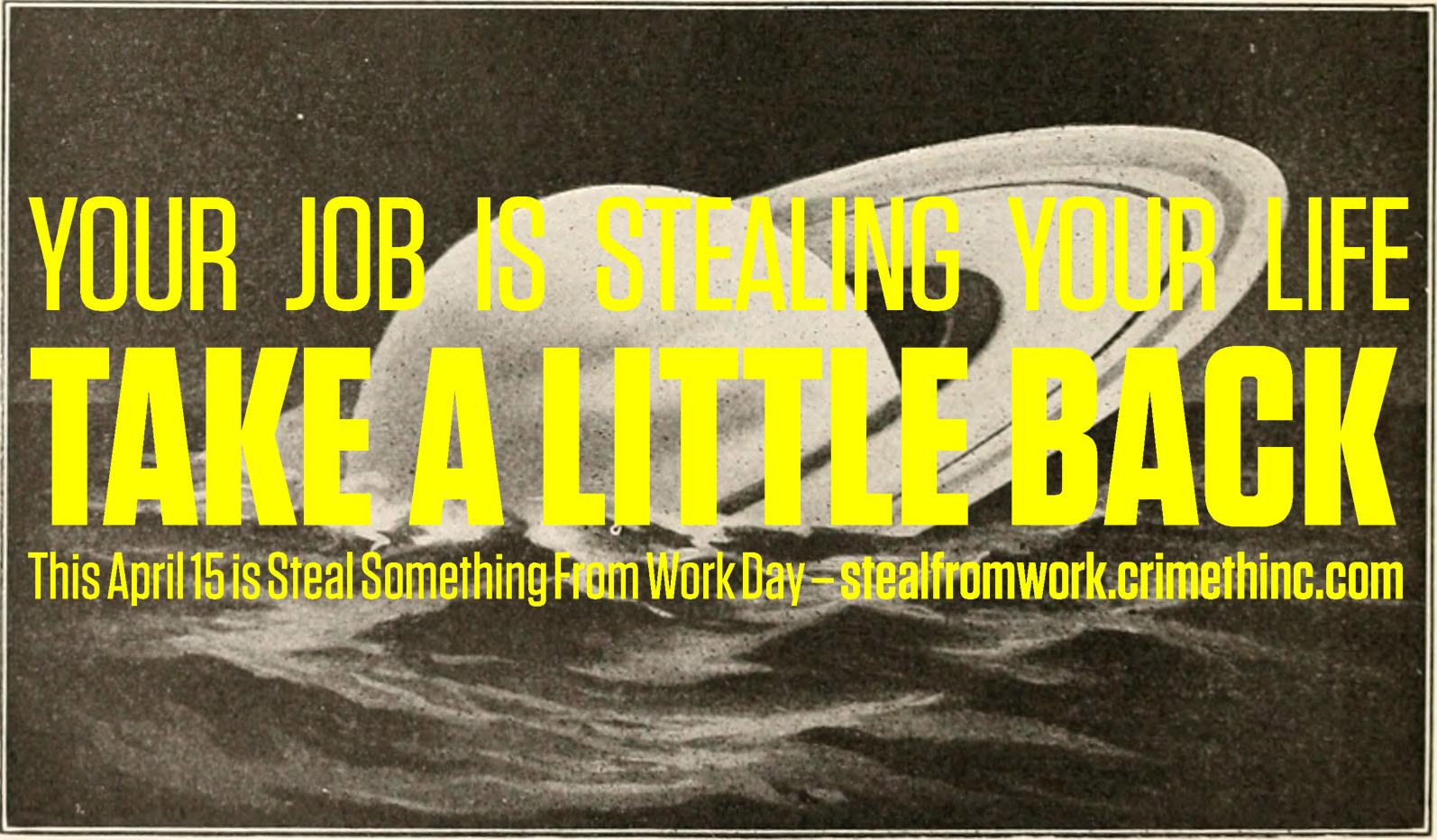
Breakfast and Lunch
I got the café I worked at to cater a community kids’ lunch. I just told my boss that I had already told them and everyone in the café that we would donate the food. When the organizer called my boss about it, he felt too embarrassed to say no, so we got a sandwich, fruit, and milk for each child.
I also used to steal food from work every week to give to a kids’ breakfast program. I would add some stuff to the “day-olds” that I was told I absolutely could never give away. I put it out back by the dumpster like I was going to throw it out, and I would simply take it to my car at the end of my shift.
It was so much food that the kids could never eat it all. I often had to take leftovers to the houseless camp.
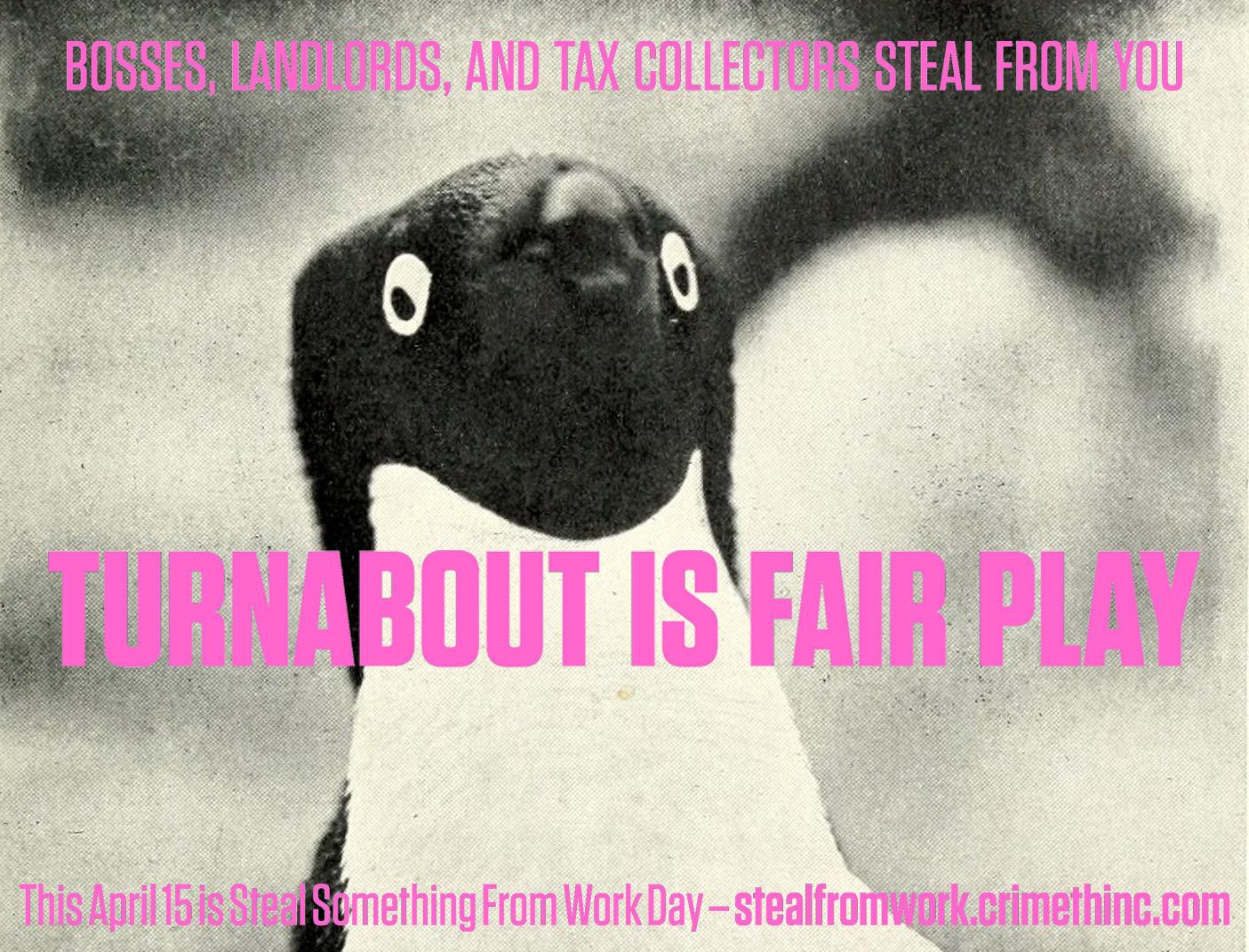
The Great Vegan Yogurt Heist
By CrimethInc. operative Gregorious
Of all those who steal from work, have stolen from work, or might steal from work, I am possibly the worst at it of anyone in history. Do not do as I do, but be sure to do as I say.
When I was in high school, I worked at a small health food store in a sleepy little New England town. The job was part time, every week for a few hours. Still, the hours I spent there weren’t worth the money. After only a couple weeks, I started to concoct a plan.
I had a friend at the time with whom I was prone to getting into trouble, so I called him and let him know that I wanted to cast him in a starring role in a scheme involving theft and chaos. I knew that the cooler at the store was easily accessible from the outside of the building through a small entryway. I knew where the key to the cooler could be found. I knew that there was no security system at the store. And I knew when no one else would be around at night. I set a plan in motion which—to my mind—combined the complexity and grandeur of Ocean’s Eleven with the intensity of Heat.
The plan was simple. We would wait until the middle of the night. My friend would have a getaway car running on the street. I would make my way around the back of the store to the cooler. I would break in, steal what I could, and escape back to the getaway vehicle. Then we would drive like bats out of hell to a secret location at which we could explore our newly acquired bounty. I was about to become the biggest criminal since Al Capone.
What if I was caught by the lone police officer who lived in the town? What if he happened to be awake—what if he was nearby, paying attention, and saw me? I would undoubtedly be sent to Alcatraz, the electric chair, and the firing squad, probably in that order. This was my one and only life we were talking about here. As the heist approached, my heart pounded faster and faster in anticipation of my new career path as a criminal.
The night arrived. We drove to the store. I was wearing the customary black outfit of the malefactor—long before wearing such attire identified you as one of the good people. My friend parked out front across the street. I got out and ran around back. I made my way through the entryway and into the cooler.
I looked around at everything there. The possibilities were endless. Would I take something small so I could conceal it as I escaped? Could I figure out a way to take everything in there at once? Should I change my mind and walk out casually to meet my fate at the hands of the SWAT team that was undoubtedly gathering in the darkness, laser sights pointed directly at my heart? I split the difference. I looked to my right, grabbed a case of vegan yogurt, and walked out.
With the case under my arm, I dashed back into the night, ready to dodge bullets and evade helicopter search beams. There were only crickets. It was a quiet New England night. The world was asleep, unaware of my heist. I could have crawled out on all fours over a span of several hours without anyone spotting me. All the same, just in case, I sprinted to the car. My friend and I drove off laughing maniacally into the night.
But the story does not end there. We drove. Not just down the street—we drove at least two towns over. Our plan was to get far enough away that we could enjoy our case of yogurt out of the reach of law enforcement. Did we plan on eating twelve yogurts each? The world will never know.
Because when we stopped the car and pulled the cardboard open to expose our riches—when we each took a spoon from the glovebox, selected a yogurt, tore it open, and took a bite—we realized that the case was expired. The yogurts were spoiled. They had the tongue-stinging taste of food gone bad: nature’s way of saying, “Stop eating this, you fools.”
Dejectedly, we discarded the entire case. It didn’t even occur to me to go back to steal something else. For years afterwards, I wondered if I had grabbed something from a pile of food to be discarded. Was that why it was beside the cooler door? Or maybe it was simply bad luck?
Years later—many years, more than thirty to be exact, and specifically while I’ve been typing this—I finally realized what we’d accomplished by stealing that yogurt. We had done the store a favor. They probably came in the next day and wondered, “Wow, what industrious employee threw out that old yogurt after closing?” They couldn’t have sold it. If they had, they would have gotten in trouble. Same if the health department had showed up to inspect them. The managers probably noted with relief that the case was gone and went about their day. We had stolen their trash.
So do not do as I do, but be sure to do as I say. If and when you steal, make it worthwhile. Make sure it means something, at least to you. Go for value first, symbolism second, and trash last. I’d love for you to end up with more than just a story. I’d like for you to end up with some kind of treasure, something representing your reclaimed agency, some example of direct action and revenge.
Or at the very least, something you can actually eat.
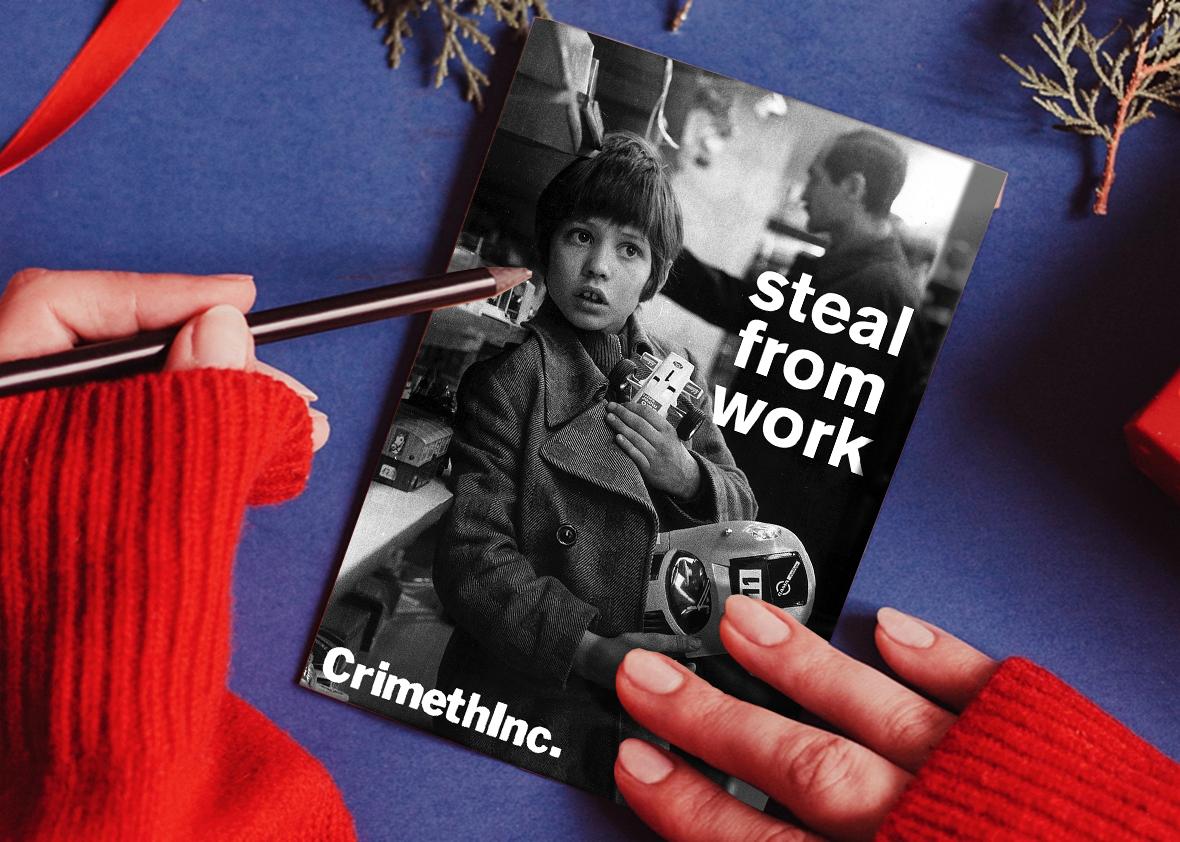
Donate to Work Day
In a secret research lab, there was a day when everyone from machine operators to software engineers to executives was asked to donate a book to work. It was in peak quarantine, early 2020 and morale was low. The message wasn’t phrased with the word “donate,” but we all knew that’s what they meant. We were asked by a director of human resources to pick a book from our personal libraries that we would let go and donate it onto a bookshelf featured prominently upon entering the factory break room. We were asked to sign a dedication inside the cover of the book. Anonymity was not acceptable.
It felt weird. They were paying us for our labor, not paying us to leave the company our personal property. It was not a coincidence that this message reached us only a month after a third of the company was fired… to cut costs. We could be next. There was an unspoken message implied about how we would never see this book again if we got fired.
Over the following week, the books began to arrive. They weren’t too interesting at first—some engineering manuals, texts on math and physics, a few pulpy genre bestsellers. The quality began to improve with science fiction and compilations of academic research. Then there were the cringe titles. Those written by the professional managerial class to motivate managers, under the disguise of improving worker productivity. Self-help titles. “Manuals” for effective strategies to improve as an employee of a corporation. Vague advice on how to succeed as a leader in corporate America.
Among this trash was a single, unique-looking cartoon book titled simply, Work. At least, it looked like a cartoon book from the cover. Taking a closer look, it was a book about the class hierarchy in American society. It’s available on this website. It presents a good analysis of contemporary capitalist class hierarchies. This research lab employed nearly everyone in the pyramid featured on the book’s cover, from the top to the bottom, including military, lawyers, and captains of industry.
After two years moving on and off the shelf, Work (which was donated new) looked as worn as the other books, many of which were much older. In the break room, a machine shop worker approached the person who signed their name under the cover and thanked them. He said he took it home for a couple weeks (the first known use of this program as if it were a public library) and the contents were eye opening. He asked for some other similar recommendations to read. It felt like the program was working, though likely not the way the original corporate controller imagined.
While this might sound like the opposite of stealing something from work, think of it as reclaiming power in a contest of ideas. Sadly, the bosses are the least attentive but fastest to act when presented with a case of workers building power through solidarity. For example, the REI sports apparel corporation recently fought their workers after employees began to organize a union for higher wages and improved conditions. Corporate leaders see you as a threat to their wealth and want to punish you at every turn. Never forget that there are people whose only job is to protect the corporation from its employees.
Corporations steal from us every day through wage theft. This particular research lab had a bad reputation of not paying overtime. Fortunately, one thing they cannot steal from us is our ideas. Spread these ideas in secret. Spread these ideas in plain sight, but understand they might fire you if they feel like these ideas are too dangerous to them. Without a labor union, you have little defense other than litigation, at best. But just because you don’t have a union doesn’t mean you are powerless to take back what is rightfully yours, your time at work. Read books on the clock. Does your employer have an “unlimited PTO” policy? Take off more time, start at 12 weeks. In some parts of the world, it is expected to have that much vacation time.
If you are ever in the position where an employer asks you to donate something to work, consider ideas that will encourage everyone to “donate their time” somewhere else. That’s a donation we can all believe in!

